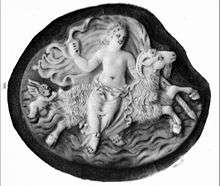Aphrodite Pandemos


Aphrodite Pandemos (Ancient Greek: Πάνδημος; "common to all the people"), occurs as an epithet of the Greek goddess Aphrodite, and that in a twofold sense, first describing her as the goddess of low sensual pleasures as Venus vulgivaga or popularis, in opposition to Aphrodite Urania, or "the heavenly Aphrodite".[1] She was represented at Elis by Scopas riding on a ram.[2] The second sense is that of Aphrodite uniting all the inhabitants of a country into one social or political body. In this respect she was worshipped at Athens along with Peitho (persuasion), and her worship was said to have been instituted by Theseus at the time when he united the scattered townships into one great body of citizens.[3] According to some authorities, it was Solon who erected the sanctuary of Aphrodite Pandemos, either because her image stood in the agora, or because the hetaerae had to pay the costs of its erection.[4] The worship of Aphrodite Pandemos also occurs at Megalopolis in Arcadia,[5] and at Thebes.[6] A festival in honour of her is mentioned by Athenaeus.[7] The sacrifices offered to her consisted of white goats.[8] Pandemos occurs also as a surname of Eros.[9]
The goddess riding on a goat was also known as Aphrodite Epitragia, "from a she-goat". According to Plutarch, she acquired this epithet from an episode in the life of Theseus when, by the recommendation of Apollo, the hero sacrificed a goat to Aphrodite before departing for Crete in hopes that she would guide him on his voyage. As Theseus sacrificed the customary she-goat, the animal was suddenly transformed into a male goat.[10]
Notes
- ↑ Plat. Sympos. p. 180; Lucret. iv. 1067.
- ↑ Paus. vi. 25. § 2.
- ↑ Paus. i. 22. § 3.
- ↑ Harpocrat. and Suid. s. v.; Athen. xiii. p. 569.
- ↑ Paus. viii. 32. § 1
- ↑ ix. 16. § 2
- ↑ xiv. p. 659
- ↑ Lucian, Dial. Meret. 7; comp. Xenoph. Sympos. 8. § 9; Schol. ad Soph. Oed. Col. 101; Theocrit. Epigr. 13.
- ↑ Plat. Symp. l. c.
- ↑ Rachel Rosenzweig (2004). Worshipping Aphrodite: Art and Cult in Classical Athens. University of Michigan Press. p. 71. ISBN 0-472-11332-1.
References
![]() This article incorporates text from a publication now in the public domain: Smith, William, ed. (1870). "Pandemos". Dictionary of Greek and Roman Biography and Mythology.
This article incorporates text from a publication now in the public domain: Smith, William, ed. (1870). "Pandemos". Dictionary of Greek and Roman Biography and Mythology.